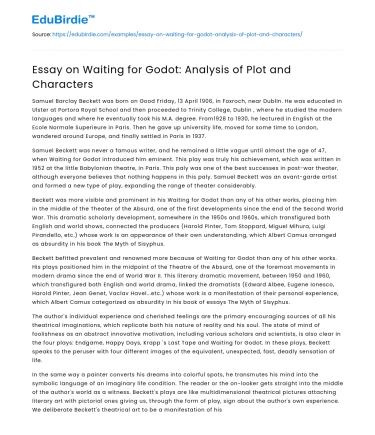Introduction
Samuel Beckett's "Waiting for Godot" stands as a seminal piece of 20th-century drama, often categorized within the "Theatre of the Absurd." The play's plot, seemingly simple in its structure, is a profound exploration of existentialist themes, where two protagonists, Vladimir and Estragon, wait for the mysterious Godot. This perpetual waiting sets the stage for a narrative that defies conventional storytelling, instead offering a reflective commentary on the human condition. The characters' dialogues and actions—or lack thereof—create a tapestry that questions the very essence of purpose and existence. This essay aims to delve into the intricacies of the plot and characters, analyzing how Beckett's use of minimalism and absurdity crafts a narrative that's both unsettling and thought-provoking. By examining the characters' interactions and the play's thematic elements, we gain insight into Beckett's critique of the search for meaning in a seemingly indifferent universe.
Exploring the Plot: A Study in Absurdity
"Waiting for Godot" defies traditional plot structures, favoring a cyclical and repetitive narrative that mirrors the existential themes it seeks to explore. The play is divided into two acts, each portraying the protagonists' wait for the enigmatic Godot, who never arrives. This absence of a conventional resolution is pivotal to the play's impact. As critic Martin Esslin points out, "the play’s lack of a traditional plot... reflects the absurdity of human existence" (Esslin, 1961). Rather than moving towards a climax or resolution, the plot emphasizes the monotony and futility of waiting, symbolizing the human quest for meaning amidst an indifferent universe.
Save your time!
We can take care of your essay
- Proper editing and formatting
- Free revision, title page, and bibliography
- Flexible prices and money-back guarantee
Throughout the play, Vladimir and Estragon engage in a series of dialogues, often marked by trivial banter and repetitive routines, which underscore the absurdity of their situation. For instance, the recurring act of Estragon removing and putting on his boots highlights the cyclical nature of their existence. This repetition serves to emphasize the stagnation and frustration inherent in their wait. Moreover, the introduction of characters like Pozzo and Lucky further complicates the narrative, offering a microcosm of power dynamics and existential despair. Pozzo's temporary blindness in Act II can be interpreted as a metaphor for humanity's blindness to the meaning of life, echoing Beckett's existentialist leanings.
Such a plot structure invites varied interpretations, with some viewing Godot as a representation of God, hope, or an unattainable goal. However, as Beckett himself stated, "If I knew, I would have said so in the play" (Bair, 1978), indicating that the ambiguity surrounding Godot's identity is intentional, encouraging audiences to grapple with the uncertainties of existence. The play’s plot, therefore, serves as a vehicle for exploring existentialist ideas, challenging audiences to confront the absurdity of life and the human tendency to seek meaning where there may be none.
Character Analysis: Protagonists in Limbo
The characters in "Waiting for Godot" are central to its thematic exploration, with Vladimir and Estragon embodying the human struggle for purpose. Their interactions are marked by a palpable sense of dependency and camaraderie, yet also reveal a deep-seated existential angst. Vladimir, often seen as the more rational of the two, grapples with the philosophical implications of their wait, pondering questions of faith and existence. In contrast, Estragon's focus on immediate physical discomforts, such as his aching feet, highlights a more visceral response to their predicament.
The dynamic between the two characters is emblematic of the dualities within the human psyche—reason versus instinct, hope versus despair. This duality is further explored through their differing reactions to the prospect of Godot's arrival. Vladimir's insistence on waiting reflects a clinging to hope and meaning, whereas Estragon's forgetfulness and desire to leave suggest a resignation to meaninglessness. As critic Ruby Cohn notes, "Vladimir and Estragon are two halves of a single self, embodying the conflict between belief and skepticism" (Cohn, 1962).
Supporting characters such as Pozzo and Lucky serve to accentuate the protagonists' existential plight. Pozzo's authoritative demeanor and eventual descent into blindness can be seen as a commentary on the futility of power and control in the face of an absurd existence. Lucky, with his incoherent monologue, represents the breakdown of communication and rationality, further emphasizing the theme of existential disorientation. These interactions not only highlight the absurdity of human behavior but also reflect the broader societal structures that compound existential suffering.
Conclusion
"Waiting for Godot" remains a powerful exploration of existential themes, characterized by its unconventional plot and richly drawn characters. Through the repetitive and cyclical narrative, Beckett captures the essence of the human condition—an endless search for meaning in a world that offers none. The characters of Vladimir and Estragon, along with Pozzo and Lucky, serve as conduits for exploring the dualities and contradictions inherent in existence. By embracing absurdity and ambiguity, Beckett challenges audiences to confront the uncomfortable realities of life and the futility of waiting for a salvation that may never come. Ultimately, "Waiting for Godot" is not just a play about waiting; it is a profound commentary on the human experience, urging us to reflect on our own quests for meaning in an indifferent universe.






 Stuck on your essay?
Stuck on your essay?

